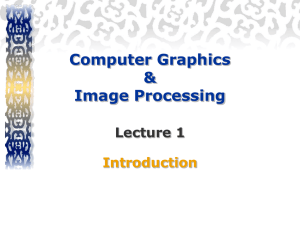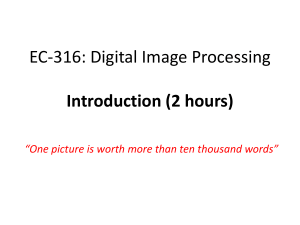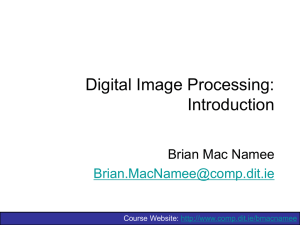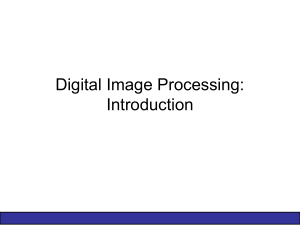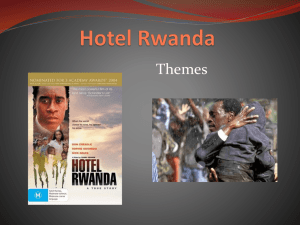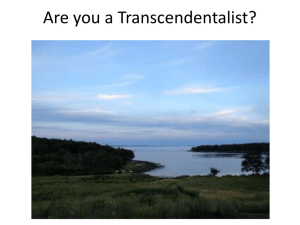digital image - Imperial College London
advertisement
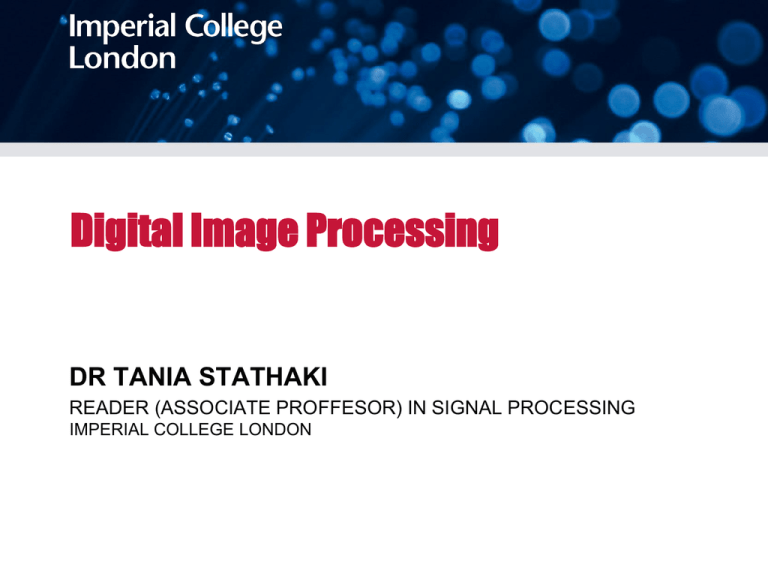
Digital Image Processing DR TANIA STATHAKI READER (ASSOCIATE PROFFESOR) IN SIGNAL PROCESSING IMPERIAL COLLEGE LONDON Introduction “One picture is worth more than ten thousand words” Anonymous Miscellanea Teacher: Dr. Tania Stathaki, Reader (Associate Professor) in Signal Processing, Imperial College London Lectures: • Mondays 11:00 – 12:00, 408 • Thursdays 10:00 – 11:00, 509 Web Site: http://www.commsp.ee.ic.ac.uk/~tania/ Course notes and slides will be available here E-mail: t.stathaki@imperial.ac.uk Office: 812 Logistics of the course Duration • 20 lectures Assessment • 100% exam • There isn't any coursework or homework Textbook • “Digital Image Processing”, Rafael C. Gonzalez & Richard E. Woods, Addison-Wesley, 2002 Content of this lecture This lecture will cover: • • • • • • What is a digital image? What is digital image processing? History of digital image processing Image processing problems Material covered in this course Applications of image processing Digital Image • What is a digital image? • In what form is a digital image stored? • Why are we able to use digital images? Images taken from Gonzalez & Woods, Digital Image Processing (2002) What is a Digital Image? A digital image is a representation of a two-dimensional image as a finite set of digital values, called picture elements or pixels Images taken from Gonzalez & Woods, Digital Image Processing (2002) What is a Digital Image? (cont…) Pixel values typically represent gray levels, colors, distance from camera, etc. Remember digitization implies that a digital image is an approximation of a real scene 1 pixel In What Form is a Digital Image Stored? Common image formats include: • 1 sample per point (grayscale) • 3 samples per point (Red, Green, and Blue) • Video (above information plus time) For most of this course we will focus on grey-scale images What is Digital Image and Video Processing? Digital image (and video) processing focuses on two major tasks • Improvement of pictorial information for human interpretation • Processing of image data for storage, transmission and representation for autonomous machine perception Some argument about where image processing ends and fields such as image analysis and computer vision start ! What is DIP? (cont…) The continuum from image processing to computer vision can be broken up into low-, mid- and high-level processes Low Level Process Mid Level Process High Level Process Input: Image Output: Image Input: Image Output: Attributes Input: Attributes Output: Understanding Examples: Noise removal, image sharpening Examples: Object recognition, segmentation Examples: Scene understanding, autonomous navigation In this course we will stop here In Terms of Signal Representation Digital Image and Video Processing is the manipulation of still and moving images, treated as multidimensional signals • still images f ( x, y) • moving images f ( x, y , t ) • other signals (CT, MRI) f ( x, y, z, t ) Images taken from Gonzalez & Woods, Digital Image Processing (2002) History of Digital Image Processing Early 1920s: One of the first applications of digital imaging was in the newspaper industry • The Bartlane cable picture transmission service • Images were transferred by submarine cable between London and New York • Pictures were coded for cable transfer and reconstructed at the receiving end on a telegraph printer Early digital image Images taken from Gonzalez & Woods, Digital Image Processing (2002) History of DIP (cont…) Mid to late 1920s: Improvements to the Bartlane system resulted in higher quality images • New reproduction processes based on photographic techniques • Increased number of tones in reproduced images Improved digital image Early 15 tone digital image Images taken from Gonzalez & Woods, Digital Image Processing (2002) History of DIP (cont…) 1960s: Improvements in computing technology and the onset of the space race led to a surge of work in digital image processing • 1964: Computers used to improve the quality of images of the moon taken by the Ranger 7 probe • Such techniques were used in other space missions including the Apollo landings A picture of the moon taken by the Ranger 7 probe minutes before landing Images taken from Gonzalez & Woods, Digital Image Processing (2002) History of DIP (cont…) 1970s: Digital image processing begins to be used in medical applications • 1979: Sir Godfrey N. Hounsfield & Prof. Allan M. Cormack share the Nobel Prize in medicine for the invention of tomography, the technology behind Computerised Axial Tomography (CAT) scans Typical head slice CAT image Digital Image Acquisition: Sampling 256x256 64x64 Digital Image Acquisition: Quantisation 0 255 255 0 0 0 0 255 0 0 0 0 255 0 0 0 0 255 0 0 0 255 255 255 0 Sampling and Quantisation 256x256 256 levels 256x256 32 levels Sampling and Quantisation cont. 256x256 256 levels 256x256 2 levels Key Stages in Digital Image Processing Image Restoration Image Compression Image Enhancement Morphological Processing Image Modelling (Transforms) Segmentation Image Acquisition Object Recognition Real life scene Colour Image Processing Representation & Description Image Acquisition Image Restoration Image Compression Image Enhancement Morphological Processing Image Modelling (Transforms) Segmentation Image Acquisition Object Recognition Real life scene Colour Image Processing Representation & Description Image Modelling-Image Transforms (Part 1) Image Restoration Image Compression Image Enhancement Original Image Image Modelling (Transforms) Fourier Transform Amplitude Phase Morphological Processing Segmentation Image Acquisition Object Recognition Real life scene Colour Image Processing Representation & Description Image Enhancement (Part 2) Image Restoration Image Compression Image Enhancement Morphological Processing Image Modelling (Transforms) Segmentation Image Acquisition Object Recognition Real life scene Colour Image Processing Representation & Description Image Restoration (Part 3) Image Restoration Image Compression Image Enhancement Morphological Processing Image Modelling (Transforms) Segmentation Image Acquisition Object Recognition Real life scene Colour Image Processing Representation & Description Image Compression (Part 4) Image Restoration Image Compression Image Enhancement Morphological Processing Image Modelling (Transforms) Segmentation Image Acquisition Object Recognition Real life scene Colour Image Processing Representation & Description Morphological Processing Image Restoration Image Compression Image Enhancement Morphological Processing Image Modelling (Transforms) Segmentation Image Acquisition Object Recognition Real life scene Colour Image Processing Representation & Description Segmentation Image Restoration Image Compression Image Enhancement Morphological Processing Image Modelling (Transforms) Segmentation Image Acquisition Object Recognition Real life scene Colour Image Processing Representation & Description Object Recognition Image Restoration Image Compression Image Enhancement Morphological Processing Image Modelling (Transforms) Segmentation Image Acquisition Object Recognition Real life scene Colour Image Processing Representation & Description Representation and Description Image Restoration Image Compression Image Enhancement Morphological Processing Image Modelling (Transforms) Segmentation Image Acquisition Object Recognition Real life scene Colour Image Processing Representation & Description Colour Image Processing Image Restoration Image Compression Image Enhancement Morphological Processing Image Modelling (Transforms) Segmentation Image Acquisition Object Recognition Real life scene Colour Image Processing Representation & Description Part 1: Image Transforms Original Image Fourier Transform Amplitude Phase Part 2: Image Enhancement Original Image High Pass Filtering Images taken from Gonzalez & Woods, Digital Image Processing (2002) Examples: Image Enhancement One of the most common uses of DIP techniques: improve quality, remove noise etc Part 3: Image Restoration Distorted Image Restored Image Distortion due to camera misfocus Original image Distorted image Distortion due to camera misfocus Camera lens Distortion due to motion Camera lens Distortion due to random noise Original image Distorted image Part IV: Image Compression Signal-Processing Based: Encoder f ( x, y) H g ( x, y ) Decoder g ( x, y ) fˆ ( x, y) H 1 Compressed Representation Applications Medical images Satellite images Astronomy Industrial inspection Artistic effects Geographical Information Systems Law Human computer interfaces Images taken from Gonzalez & Woods, Digital Image Processing (2002) Medicine Take slice from MRI scan of canine heart, and find boundaries between types of tissue • Image with gray levels representing tissue density • Use a suitable filter to highlight edges Original MRI Image of a Dog Heart Edge Detection Image Medical Images MRI of normal brain Medical Images X-ray of knee Medical Images Fetal ultrasound Satellite imagery Volcanos in Russia and Alaska Astronomical images Examples: The Hubble Telescope Launched in 1990 the Hubble telescope can take images of very distant objects However, an incorrect mirror made many of Hubble’s images useless Image processing techniques were used to fix this Images taken from Gonzalez & Woods, Digital Image Processing (2002) Industrial Inspection • Human operators are expensive, slow and unreliable • Make machines do the job instead • Industrial vision systems are used in all kinds of industries Artistic Effects Artistic effects are used to make images more visually appealing, to add special effects and to make composite images Images taken from Gonzalez & Woods, Digital Image Processing (2002) Geographical Information Systems Geographic Information Systems • Digital image processing techniques are used extensively to manipulate satellite imagery • Terrain classification • Meteorology Images taken from Gonzalez & Woods, Digital Image Processing (2002) Examples: GIS (cont…) Night-Time Lights of the World data set • Global inventory of human settlement • Not hard to imagine the kind of analysis that might be done using this data Images taken from Gonzalez & Woods, Digital Image Processing (2002) Law Image processing techniques are used extensively by law enforcers • Number plate recognition for speed cameras/automated toll systems • Fingerprint recognition • Enhancement of CCTV images HCI • Try to make human computer interfaces more natural • Face recognition • Gesture recognition • Does anyone remember the user interface from “Minority Report”? • These tasks can be extremely difficult
